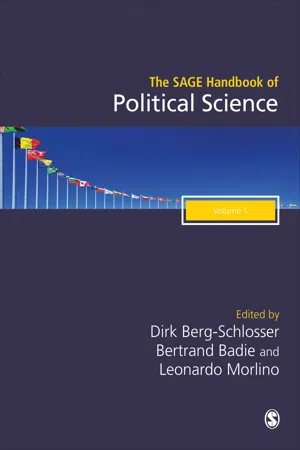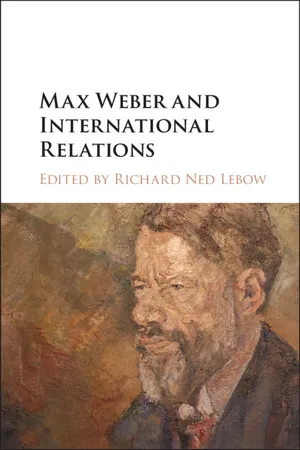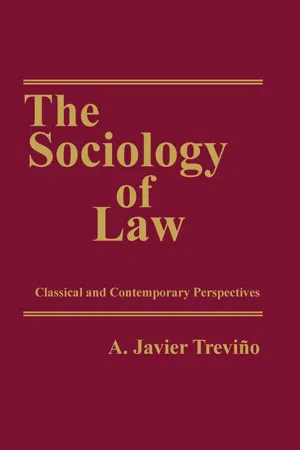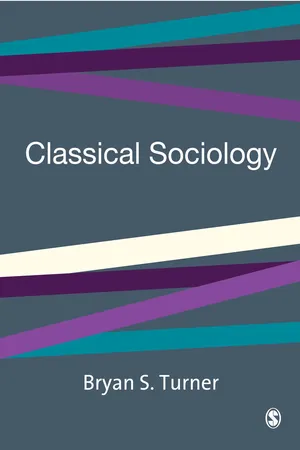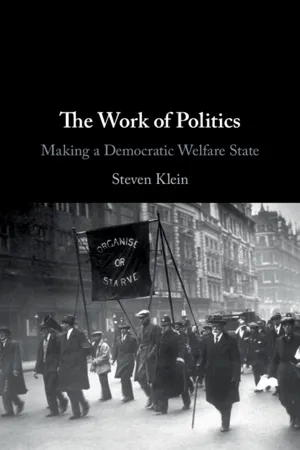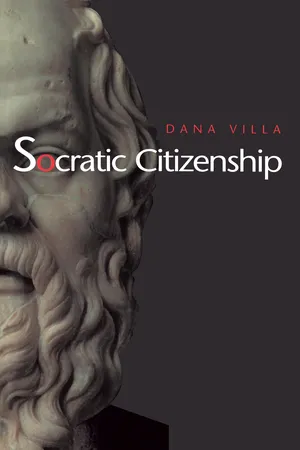Politics & International Relations
Max Weber
Max Weber was a German sociologist, philosopher, and political economist who is known for his work on the rationalization of society and the concept of authority. He emphasized the importance of bureaucracy in modern governance and explored the relationship between religion, capitalism, and social change. Weber's ideas have had a significant influence on the study of politics and international relations.
Written by Perlego with AI-assistance
Related key terms
1 of 5
11 Key excerpts on "Max Weber"
- eBook - ePub
- Talcott Parsons(Author)
- 2017(Publication Date)
- Routledge(Publisher)
6Max Weber and the Contemporary Political Crisis *I. THE SOCIOLOGICAL ANALYSIS OF POWER AND AUTHORITY STRUCTURES
We are living in a time when men most urgently feel the need of intellectual clarification of the social and political situation in which they stand. By no means all the great masters of social thought who have made important potential contributions to such clarification are sufficiently well known, even among social and political scientists. One of these is Max Weber who, in the English-speaking world, is known more as a sociologist of religion and a methodologist of social science than as an interpreter of the political scene. Weber’s scope of interest in institutional problems, with specific reference to the modern Western world, was, however, exceedingly broad, and a substantial part of his work was centered on the field of political institutions, particularly in their relations to the economic order and to other aspects of the social structure.Weber died in 1920 so the question may be asked, of what relevance could his work be to a situation arising twenty years after his death? There can of course be no question of his having predicted the present situation in exact detail, nor having predicted its outcome. He did, however, have certain striking ideas about the situation in his own time1 which held many of the roots from which that of the present has grown. Certainly far less than most social scientists would Weber have been surprised by the course developments have taken, had he lived to see them. But still more, Weber developed an original generalized analysis of the social structure of political relationships2 - eBook - ePub
- Dirk Berg-Schlosser, Bertrand Badie, Leonardo Morlino, Dirk Berg-Schlosser, Bertrand Badie, Leonardo Morlino, SAGE Publications Ltd(Authors)
- 2020(Publication Date)
- SAGE Publications Ltd(Publisher)
Max Weber and German Politics 1890–1920 (1984). Mommsen insisted heavily on Weber's nationalism and his understanding of international relations (IR) in terms of power politics.In a political science that considered itself as a ‘Demokratiewissenschaft’ and as being positively involved in the process of democratization of Germany, a Max Weber who had fought fiercely for the democratization of Germany during the First World War and the Revolution and had made important contributions to shaping the constitution of the Weimar Republic, paradoxically had no place. His relationship to democracy was perceived as ambivalent: Weber's commitment to parliamentary democracy was not based on normative and philosophical ideas, but on historically founded rational considerations about the form of government that on the one hand provided Germany as a modern industrial nation with the means to assert itself in the competition of the ‘power states', and on the other hand guaranteed citizens a minimum of political equality and participation. In the 1950s and 1960s, however, Weber's concept of politics, his (alleged) ‘pluralism of values’ and his (misunderstood) ‘postulate of freedom of value judgement posed a threat to philosophical-normative political science’ (Hübinger et al., 1990: 184).In the early 1960s in Germany, the actual Weber renaissance took place in sociology and social history. As to politics and the political, the discussion did not focus on his ideas about parliamentary democracy but almost exclusively on Mommsen's interpretation of Weber's nationalism, his attitude to imperialism and his alleged theory of plebiscitary leader democracy, which, according to the accusations, had helped to mentally attune the German people to the National Socialist dictatorship. The result of this was that at the Heidelberg Congress of the German Society of Sociology, organized in honour of Weber's centenary in 1964, the discussion on the political dimension of Weber's work was tailored entirely to the topic of power politics, for which Raymond Aron had been invited as a keynote speaker. Aron's Weber interpretation ended in an aporia: ‘Weber after all betrayed himself in his theory of politics for power was never his aim, neither for himself, nor for the nation. […] The man and the philosopher leave us an inheritance undiminished by the mistakes of the theoretician of power politics - eBook - PDF
- Syed Farid Alatas, Vineeta Sinha(Authors)
- 2017(Publication Date)
- Palgrave Macmillan(Publisher)
Max Weber (1864–1920) Syed Farid Alatas Karl Emil Maximilian Weber was born in 1864 in the town of Erfurt in Prussia, Germany. He was a sociologist but had significant contributions to the field of political economy. In addition to that, he pioneered many ideas that influenced scholars in various disciplines such as history and jurisprudence. 1 Weber was not as famous those days as he became posthumously. He was almost unknown in English-speaking world, little known in Europe, and was not considered a dominant scholar in Germany. It is generally agreed that Weber was often not understood. In fact Andreski says that although Weber was a great scholar and thinker, he was a ‘thoroughly bad writer’ and among the great founders of the social sciences ‘scores the lowest in the skill of presentation’. 2 His standing today, however, is that of one of the major founders of modern sociology. 1 Dirk Käsler, Max Weber: An Introduction to His Life and Work (Cambridge: Polity Press, 1988), ix. 2 Stanislav Andreski, Max Weber’s Insights and Errors (London: Routledge, 2013), 6. © The Author(s) 2017 S.F. Alatas, V. Sinha, Sociological Theory Beyond the Canon, DOI 10.1057/978-1-137-41134-1_5 113 An Outline of Weber’s Sociological Theory Weber’s sociology was decidedly historical. The historical dimension was particularly important for accounting for the rise of modern capitalism in the West and the failure of modern capitalism to emerge in non- Western societies. The subject matter of Weber’s sociology was the origins of modern capitalism and the nature of modern capitalist society. Weber inquired into the various factors that accounted for the emer- gence of capitalism in the West and also theorized about the factors that impeded the development of capitalism in non-Western societies. - eBook - PDF
- Richard Ned Lebow(Author)
- 2017(Publication Date)
- Cambridge University Press(Publisher)
108 Stefano Guzzini Weber’s Theory of International Politics One of the most interesting components of Weber’s analysis of power lies in his vision of international relations. That should come as a surprise. For disheartening it is again to see a famous thinker waiting until the end of his life to write about international relations and missing the moment. In the densely printed almost 950 pages of Economy and Society, the closest we get to a section on IR is the fragment on the evolution of the nation-state, sixteen pages long, the only section, which cuts off in the middle of a sentence. 35 His international analysis is nevertheless interesting for being less straightforward than his sociology would lead us to expect. After all, Weber’s definition of the modern state has been the demarcation criterion of the entire contemporary discipline of international relations. If the modern state holds the monopoly of legitimate means of violence, no such thing can exist above it, and hence politics inside and politics outside cannot be the same. International relations remain stuck in a state of nature, and a theory of international relations would cease to exist if that difference were overcome. 36 Having defined the criterion for setting international relations apart, Aron is not convinced by Weber’s social theory, which seems to make so little out of it and hence imports unne- cessarily grim pictures of IR into domestic politics. Indeed, even Weber’s vision of international relations, his “theory of power politics,” as Aron dubs it, is ultimately a failure. 37 What kind of a theory is it? An IR-taught scholar would expect to have Weber develop his theory of “power politics” simply out of the particular setting of the international without overarching authority, the opposite to the monopoly of legitimate violence within the state. - eBook - ePub
The Sociology of Law
Classical and Contemporary Perspectives
- A. Javier Trevino(Author)
- 2017(Publication Date)
- Routledge(Publisher)
5The Weberian PerspectiveThe theoretical orientation that was laid out by German sociologist Max Weber is the second perspective that has had a significant influence on the sociology of law. The purpose of this chapter is to demonstrate how this perspective looks to political, religious, and economic factors -in explaining the law’s formulation and application. It is this eclectic approach that distinguishes the Weberian perspective from the Marxian and Durkheimian perspectives discussed in this text. Moreover, it is important to keep in mind that all three of these perspectives form the core of classical sociological theory.This chapter begins with a discussion of some of Max Weber’s key concepts and how he used them to explain (a) the three forms of political authority through which law is created and made effective, (b) the four types of lawmaking and law-finding and their connection with religious influences, and (c) the effect that the capitalist economic system had on the emergence of continental Europe’s unique legal system. The chapter concludes by looking at how certain scholars in recent years have analyzed, critiqued, and extended Weber’s concept of legitimacy, his “England problem,” and his dialogue with the ghost of Marx.Max Weber: The Eclectic Scholar
Although Marx and Engels did not identify law as a major theoretical problem, Max Weber most certainly did. To be sure, Weber produced a fairly coherent sociology of law in his magnum opus, Economy and Society. This monumental work, which Weber began toward the end of his life and never completed, helped to establish him as one of the most erudite legal scholars of all time. Not only did he develop his legal sociology in this work, it is here that he also produced his theories of political sociology, sociology of religion, and sociology of economics. Weber’s expansive sociological knowledge allowed him to thoroughly analyze various legal systems within the context of different cultures, at several periods in history, and at the subjective as well as the objective levels of social reality. Let us see how Weber’s life and influences prepared him to be the author of Economy and Society. - eBook - ePub
Politics, Sociology and Social Theory
Encounters with Classical and Contemporary Social Thought
- Anthony Giddens(Author)
- 2013(Publication Date)
- Polity(Publisher)
1 Politics and Sociology in the Thought of Max WeberThe aim of this chapter is to elucidate some of the connections between Weber’s political writings and his more academic contributions to the social sciences. As a preface to the main part of the discussion, it will be useful to mention a few of the important moments in his political and intellectual career.Max Weber was born in 1864, the son of a prominent politician, a member of the National Liberal Party. In her biography of her husband, Marianne Weber described in some detail the richness of the influences which the young Weber experienced in his father’s home. From an early age he came into contact with many of the leading figures in the Prussian political and academic worlds, including Treitschke, Knapp, Dilthey and Mommsen. His childhood spanned a period of years which was of decisive significance for German political development: the crucial phase in German history at which, under the leadership of Bismarck, the country at last became a centralized nation-state. The German victory over France in 1870–1 had an effect upon the Weber household which left a lasting emotional impact upon Max, although he was no more than six years old at the time.1 While he never obtained political office, there was no point in his life at which political and academic interests did not intertwine in his personal experience. His youthful impressions of politics, filtered first through his father’s circle and, as a young man, through the influence of his uncle, Hermann Baumgarten, produced in Weber an ambivalent orientation towards the achievements of Bismarck which he never fully resolved, and which lay at the origin of the whole of his political writings.Weber’s earliest academic writings concerned legal and economic history. What appeared to be purely technical, scholarly works, however – such as the dissertation on land tenure in ancient Rome, which Weber wrote in 1891 – actually held broader social and political implications in his thinking. In the thesis, Weber rejected the view, taken by some scholars of the day, that the economic history of Rome was a unique set of events, totally unamenable to analysis in terms of concepts derived from other situations; and he perceived in the social and economic structure of Rome some of the characteristics later to be discerned in the formation of capitalism in post-medieval Europe. Moreover, although he refused to accept some of the more specious comparisons which others had attempted to draw along these lines, the tensions which developed in the ancient world between the agrarian economy of large landed estates and emergent commerce and manufacture seemed to him to illuminate some of the problems facing contemporary Germany. He had the opportunity to confront these problems directly in a study, published in 1892, of the Junker estates to the east of the Elbe. This work formed part of a larger piece of research sponsored by the Verein für Sozialpolitik, investigating the conditions of land tenure in several main regions in Germany. Through his affiliation to the Verein, a group of ‘academic socialists’ concerned with current social and political issues, Weber was able to participate in discussion and interchange of ideas with a number of younger economists and historians interested above all in the problems facing Germany in its transition to industrial capitalism. While the founder members of the Verein, the ‘older generation’ of economists such as Wagner, Schmoller and Brentano, were interested primarily in questions connected with formulating policies of partial state intervention in economic life, the ‘younger generation’ – including, besides Weber, such authors as Sombart, Schulze-Gaevernitz and Tönnies – concerned themselves more broadly with the nature and origins of capitalism, and were heavily influenced by Marx. - eBook - PDF
Reason and Cause
Social Science and the Social World
- Richard Ned Lebow(Author)
- 2020(Publication Date)
- Cambridge University Press(Publisher)
504–505. 14. Weber, Max Weber, p. 40. 15. Ibid., pp. 412, 521–522; Mommsen, Max Weber and German Politics, pp. 190–282, on Weber and World War I. 16. Toller did not pursue an academic career. Dahlmann, “Max Weber’s Relation to Anarchism and Anarchists”; Mommsen, Political and Social Theory of Max Weber, chap. 6, on Weber and Michels. 17. Radkau, Max Weber, pp. 432–436. 18. Weber, “Parliament and Government in Germany under a New Political Order”; Weber, Russian Revolutions, p. 225. 19. Weber, “Zwischen zwei Gesetzen” [Between Two Laws] and “Deutschland unter den Europäischen Weltmachten” [Germany under the European Great Powers] speech in Munich, October 22, 1916, p. 30. 20. Weber, Max Weber, p. 631. 21. Report of the Heidelberger Tageblatt, in ibid., pp. 631–632. 22. Weber, “Zur Lage der bürgerlichen Demokratie in Russland.” 23. Ibid. Weber acknowledged the influence in this regard of his friend political scientist Georg Jellinek. 24. On Weber’s methodological positions, see Ringer, Max Weber, chap. 3; Lebow, “Weber’s Search for Knowledge”; Jackson, “Production of Facts”; Guzzini, “Max Weber’s Power.” 25. Weber read Nietzsche and subscribed to his “ethic of human dignity” [Vornehmheit] but made only one reference to him in his letters. Ringer, Max Weber, p. 241. 26. Weber, Max Weber, p. 325. 27. Weber, Protestant Ethic and the Spirit of Capitalism and Sociology of Religion. 28. Ibid., Protestant Ethic and the Spirit of Capitalism, p. 6. 29. Parsons, Structure of Social Action, pp. 51–74, 77–82. 30. Ibid., p. 5. 31. White, Social Thought in America. 32. Hughes, Consciousness and Society, chap. 2. 33. Ibid. 34. Haskell, Emergence of Professional Social Science, p. 7. 35. White, Social Thought in America, chaps. 2–3, 7. 36. Loeb, Mechanistic Conception of Life; Watson, “Psychology as the Behaviorist Views It.” 37. US Census Bureau, “1800–1990: Changes in Urban/Rural U.S. - eBook - PDF
- Bryan S Turner(Author)
- 1999(Publication Date)
- SAGE Publications Ltd(Publisher)
Very few commentaries on Weber’s intellectual orientations have taken sufficient notice of his abiding focus on legal issues. It is not enough, for example, merely to take note of the fact that Weber undertook many impor-tant historical studies in law, which are reflected in the collection Max Weber on Law in Economy and Society (Rheinstein, 1954), or that Weber treated legal rationalization as an important foundation of modern capitalist activity. Among recent evaluations of Weber as a legal theorist, only Anthony T. Kronman (1983), after Talcott Parsons (1971), has fully understood that Max Weber on Economy and Society 75 Weber’s notions of personality and rationality were deeply dependent on legal ideas of personality and responsibility (Holton and Turner, 1989). Weber’s legal training should also alert us to the fact that throughout his academic career he was hesitant about employing the word ‘sociology’ to describe his intellectual endeavours. Nevertheless, an involvement with social theory and social questions always shaped his approach to religion, law, politics and history. Thus, Weber joined the Association for Social Policy ( Verein für Sozialpolitik ) which had been founded in 1873 primarily by a group of German economists (including Wagner, Schmoller and Brentano). On behalf of the Association, Weber plunged into a survey of the position of rural workers in the East-Elbian region of Germany ( Die Lage der Landarbeiter im ostelbischen Deutschland ). In eastern Germany, the agricultural economy depended heavily (partly because of the con-tinuity of traditional social relations on the Junker estates) on the influx of Polish and Russian migrant labour. Weber was interested in and con-cerned by the political and social implications of this dependency on foreign labour. This apparently factual study of conditions in agricultural production in fact reflected two aspects of Weber’s political orientation, but also the underlying assumptions of his sociology. - eBook - PDF
The Work of Politics
Making a Democratic Welfare State
- Steven Klein(Author)
- 2020(Publication Date)
- Cambridge University Press(Publisher)
In this debate, then, democratic ideals or values are mostly interpreted as a return to particularism and class legislation over and against the neutrality of bourgeois legal-rationality. For a discussion of Weber’s relationship to the refeudalization thesis, see Stephen M. Feldman, “An Interpretation of Max Weber’s Theory of Law: Metaphysics, Economics, and the Iron Cage of Constitutional Law,” Law & Social Inquiry 16, no. 2 (1991): 205–248; John P. McCormick, Weber, Habermas and Transformations of the European State: Constitutional, Social, and Supranational Democ- racy (Cambridge University Press, 2007), 70–125; David M. Trubek, “Max Weber’s Tragic Modernism and the Study of Law in Society,” Law & Society Review 20, no. 4 (1986): 573–604. 53 For Weber’s views of social democracy, see Victor Strazzeri, “Max Weber and German Social Democracy: A Study on the Relationship between the Liberal Bourgeoisie and the Labor Movement in Imperial Germany (1882–1899)” (Freie Universität Berlin, 2017). Charisma and Domination in Economy and Society 85 Why does value rationality fall out? As we will see, it is because value rational- ity is actually charisma in its most ethically rigorous and so most extraordinary form, whereby it fully answers the extraordinary need for meaning and salvation but is irreconcilably opposed to the domain of everyday, material concerns. At the core of Weber’s conceptual terrain is his tri-partite definition of domination – traditional, legal-rational, and charismatic – which in turn are structured around two binaries: ordinary/extraordinary and naturalistic/ rationalized. As ideal types, each of Weber’s categories of domination is an effort to take to a logical extreme these underlying oppositions. Traditional and legal-rational are both orders based on ordinary, material, calculable needs – with traditional the non-rationalized, naturalistic end of the continuum and legal-rational, the rationalized end. - eBook - ePub
- Karl Jaspers, Jaspers Karl(Authors)
- 2013(Publication Date)
- Routledge(Publisher)
Would Max Weber have despaired of the German nation altogether? Even though her face was incomparably more disfigured in 1933-1945 than it had been in 1918, even though the basest elements from the abyss had taken hold of the state and seized the technological equipment of an able people, even though what was still genuinely German was being killed or reduced to silence, did not something live on that remained German? Would Max Weber have allowed himself to be destroyed as a sacrifice for what is German? I do not believe so. We cannot know. Perhaps he would have remained silent. But of one thing I feel sure: to despair of the Germans altogether, totally and forever, would not have been possible for Max Weber.When politics, understood as the politics of free people reacting to the course of their destiny, comes to an end, what then? Then the individual, deprived of his political dignity, may still be allowed, within the existential sphere left to him, to realize what is exposed at any moment to ruin from without: the intimacy of private existence in human relationships between individuals, the knowledge of things, inner truthfulness, fortitude amid destruction. Politics is destiny, and continues to be so even when this destiny signifies the end of politics, but politics is not the ultimate end for man as man.* “Coulcur” refers to the uniforms of German student organizations.1 Josef Alois Schumpeter, 1883-1950, Austrian economist, author of Kapitalismus, Sozialismus rind Demokratie. The conversation is recorded in Felix Somary, Erinnerungen, pp. 171 ff.Passage contains an image The Scientist
Max Weber gained mastery over enormous fields of knowledge. He commanded the most divergent disciplines and was thoroughly familiar with the methods of natural science no less than of the humanities. Trained in law, he also studied theology; he was at home in the historical reality of past and present, in China and India, in the East and West. But all this would merely show the unusual scope of his mind. What provided his scientific activity with its axis was that man - eBook - PDF
- Dana Villa(Author)
- 2020(Publication Date)
- Princeton University Press(Publisher)
53 Indeed, this is an extremely important dimen-sion of Weber's commitment to parliamentary politics. But it is misleading to view Weber's preference for a strong parliament as simply instrumental, a function of his somewhat desperate search for powers that would offset the stifling (and politically disastrous) rule of the officials. 54 It is better, I think, to follow Wolfgang Momm-sen's suggestion and view Weber's stress upon the need for a strong parliament—one with genuine authority—as part of his broader commitment to democratization and the cultivation of freedom-preserving political struggle. 55 It is true that Weber did not think that the average citizen had much to contribute to this struggle, or would find life dramatically transformed by greater democratization of the political system. Weber notoriously thought that democracy was simply one of sev-eral forms of domination (Herrschaft) characteristic of the modern world. 56 To think that democracy as a form of government would overcome the distinction between ruler and ruled was to delude one-self. The best that could be said about mass democracy was that it was a form of domination in which the leaders were freely elected. 57 202 Max Weber Yet this form of domination also preserved the maximum amount of freedom for the individual and contributed (at least in its parliamen-tary form) to the political education not only of elites but of the nation—no small achievement in the infantilized political culture of post-Bismarck Germany. The emphasis on political education is evident throughout Par-liament and Government. As he had done twenty-two years earlier in the Antrittsrede, Weber constructs a close link between political education and political struggle.
Index pages curate the most relevant extracts from our library of academic textbooks. They’ve been created using an in-house natural language model (NLM), each adding context and meaning to key research topics.

